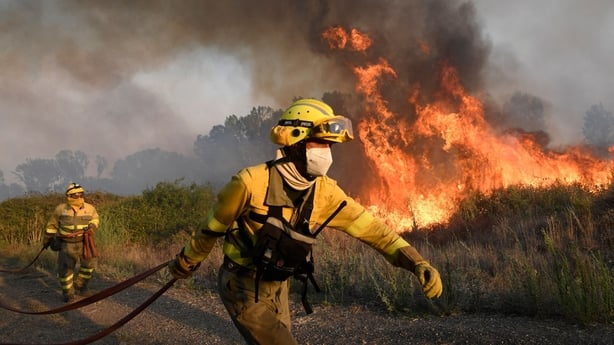More than 61,000 people died due to the heat during Europe's record-breaking summer last year, according to a study which called for more to be done to protect against even deadlier heatwaves expected in the coming years.
The world's fastest warming continent experienced its hottest summer on record in 2022, as countries were hit by blistering heatwaves, crop-withering droughts and devastating wildfires.
The European Union's statistics agency Eurostat had reported an unusually high number of excess deaths over the summer, but the amount directly linked to the heat had not been previously quantified.
A team of researchers looked at data on temperature and mortality from 2015 to 2022 for 823 regions across 35 European countries, covering a total of 543 million people.
The researchers from the Barcelona Institute for Global Health and France's health research institute INSERM used models to predict the deaths attributable to temperature for each region in every week of 2022's summer.
They estimated that 61,672 deaths were linked to the heat between 30 May and 4 September last year, according to the study published in the journal Nature Medicine.
A particularly intense heatwave in the week of 18-24 July caused more than 11,600 deaths alone, the study said.
"It is a very high number of deaths," said Hicham Achebak, an INSERM researcher and study co-author.
"We knew the effect of heat on mortality after 2003, but with this analysis, we see that there is still a lot of work that needs to be done to protect the population," he told AFP.
More than 70,000 excess deaths were recorded in 2003 during one of the worst heatwaves in European history.
Women and over-80s vulnerable

Last year France recorded the biggest rise in heat compared to its previous summer average, with a jump of 2.43 degrees Celsius, the study said.
Switzerland was not far behind with a 2.30C rise, followed by Italy with 2.28C and Hungary with 2.13C.
Italy had the highest death toll linked to the heat with 18,010, followed by Spain with 11,324 and Germany with 8,173.
The majority of deaths were of people over the age of 80, the study said.
Around 63% of those who died due to the heat were women, the analysis said.
The difference became more stark over the age of 80, when women had a mortality rate 27% higher than men.
Previous research has shown that Europe is warming at twice the global average.
While the world has warmed an average of nearly 1.2C since the mid-1800s, last year Europe was around 2.3C hotter than pre-industrial times.
Unless something is done to protect people against rising temperatures, by 2030 Europe will face an average of more than 68,000 heat-related deaths every summer, the new study estimated.
By 2040, there would be an average of more than 94,000 heat-linked deaths - and by 2050, the number could rise to over 120,000, the researchers said.
"These predictions are based on the current level of vulnerability and future temperatures," Mr Achebak said.
"If we take very effective measures, that vulnerability can be reduced," he added.
Raquel Nunes, a health and climate expert at the UK's Warwick University, said the study "highlights the urgent need for action to protect vulnerable populations from the impacts of heatwaves".
Chloe Brimicombe, a climate scientist at Austria's University of Graz, said it "demonstrates that heat prevention strategies need to be re-evaluated, with gender and age especially in mind".
According to the World Meteorological Organization, Europe is the world's fastest-warming continent which has been heating at twice the global average since the 1980s.
Since the mid-1800s, the world has warmed an average of nearly 1.2C.
But in Europe, the figure is almost double, with the continent now 2.3C hotter than in pre-industrial times, the organisation said in a report at the end of June.
In May, the World Weather Attribution, whose scientists study the link between extreme weather events and global warming, said such extreme heat would have been "almost impossible without climate change".


